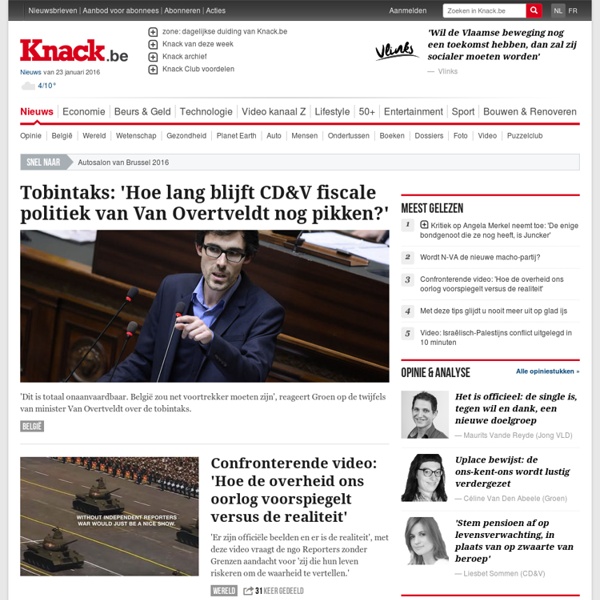



Google+: The Complete Guide Using Google+? Add Mashable to your circles. You'll get the latest about new Google+ features and tips and tricks for using the platform as well as top social media and technology news. Guide updated January 18, 2012 Google+: It's the hot social network on the block. In just a few months, Google's competitor to Facebook and Twitter has amassed more than 40 million users, and its growth hasn't stopped. Unilever Centre for Molecular Informatics, Cambridge - #openaccess The current standard of “debate” is unacceptable; arrogant and ignorant « petermr's blog I have my head down and am trying to write code – to liberate knowledge (and I haven’t forgotten #scholrev!) but occasionally have to break off and blog. Simply: the standard of debate (if it can be called such) in #openaccess is appalling. Either non-existent or fuelled by prejudice and ignorance. Since (a) many of the “debaters” and academics to whom we might look for clarity, fairness and guidance and (b) we are losing billions (sic) by not getting our act together.
I would like an explanation for why it costs $585 to email an open-access article May 23, 2012 My mind was blown yesterday by a tweet from Stuart Shieber: [Screenshot, for when case Twitter decides the original tweet is too old to be worth keeping around any more.] World Bank stakes leadership position by announcing Open Access Policy and launching Open Knowledge Repository under Creative Commons Diane Peters, April 10th, 2012 The World Bank has announced a new Open Access Policy! Effective July 1, 2012, the Open Access Policy requires that all research outputs and knowledge products published by the Bank be licensed Creative Commons Attribution license (CC BY) as a default. Today, as the first phase of this policy is unfolded, the Bank launched a new Open Knowledge Repository with more than 2,000 books, articles, reports and research papers under CC BY. President of the World Bank Group, Robert B. Zoellick, said in the press release:
Guide to Creative Commons » OAPEN-UK An output of the OAPEN-UK project, this guide explores concerns expressed in public evidence given by researchers, learned societies and publishers to inquiries in the House of Commons and the House of Lords, and also concerns expressed by researchers working with the OAPEN-UK project. We have also identified a number of common questions and have drafted answers, which have been checked by experts including Creative Commons. The guide has been edited by active researchers, to make sure that it is relevant and useful to academics faced with making decisions about publishing. This guide is made available in open access using a CC BY licemce. Readers can view the guide online (see below) or downlaod a PDF copy.
Essay on open access scholarship We are the provosts of 11 large research universities that engage in over $5.6 billion of funded research each year. That research is directed at serving the public good through medical advances, improved defense systems, enhanced agricultural and industrial productivity, technological innovation, and reasoned social policy. In the aggregate, the outcomes of this research fuel America’s global leadership, improve the quality of life in our communities, and enrich the educational experience of our students. While the collective portfolio of federally funded research undertaken by our universities incontrovertibly strengthens our country, the research process itself is strengthened by an academic culture that encourages the free and open exchange of ideas among scholars.
Why Non-Commercial (CC-NC) #openaccess does not achieve useful outcomes for authors The “non-commercial” licence CC-BY-NC option for “open access” is often promoted (e.g. by Heather Morrison) as a means to restrict inappropriate use of the article. It is suggested that NC will prevent pharmaceutical companies from using the information in the article. This is misguided – all that copyright does it to restrict the copying of the article – the information in it can be re-used without permission
Elsevier’s Alicia Wise on the RWA, the West Wing, and Universal Access In recent years I have noticed that it is pretty difficult for journalists not attached to big media to obtain interviews with Elsevier executives — except where the purpose of the interview is to talk about a new product, or the company’s latest financial results. Certainly, Elsevier has appeared very reluctant to talk about Open Access (OA). This led me to conclude that the company believes it only needs to talk to two groups of people: its shareholders and its customers — where customer implies not the researchers whose papers provide the content published in its journals, but the librarians who purchase those journals, invariably by means of the controversial Big Deal (aka “bundling”). All changed If my conclusion was correct, it seems safe to say that this has all changed in the past month or so.
Fighting Poverty Together: Open Repository Partners With Oxfam From Matt McKay, Head of Communications, BioMed Central London, UK Today BioMed Central is pleased to announce that today, Oxfam GB adopts ‘Open Repository’ – the service from open access specialist BioMed Central, which allows organizations to build, launch, host and maintain their own repositories. While Oxfam is best known for its anti-poverty program and campaigning work, the organization also produces vital research and policy materials from its experience across the world. Through the implementation of the Open Repository system, Oxfam is now able to maximize the distribution of this documentation in a one-stop personalised repository - at a fraction of the cost of other commercial systems. Oxfam works with others to overcome poverty and suffering and to have the greatest possible impact on the lives of poor people worldwide.